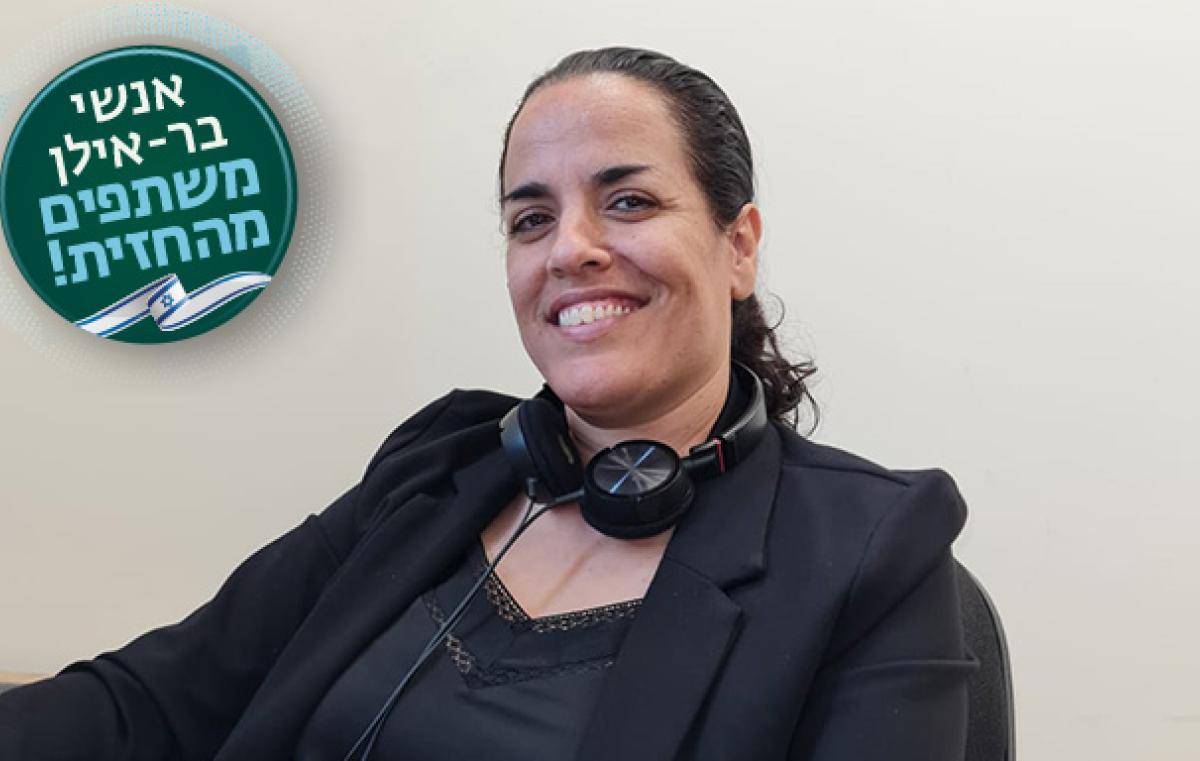Mor Shapira
Mor Shapira, a lecturer in the Department of Arabic at Bar-Ilan University, applies her knowledge of Arabic and nine other languages, her Intel capabilities, and her rare familiarity with various Arab cultures, to support the IDF's efforts during the war

Mor Shapira, who is fluent in 10 languages (Hebrew, English, Arabic, Persian, French, Italian, Spanish, Turkish, Portuguese, and Swedish), watches TV broadcasts from Arab countries, which provide her with a unique perspective on what she terms "the Theatre of the Absurd in the Middle East." Accordingly, she was recruited at the beginning of the Iron Swords war to support classified missions.
"At the onset of the war, it was clear to me that I would either be recruited, or volunteer," says Mor. "I assembled a team with the goal of supporting various IDF wartime efforts using language capabilities, covert listening and Signals Intelligence (SIGINT) skills. Our task is to understand the relevant people, terrain, local jargon, and culture. The mission demands close familiarity with the area. We listen to every small detail, including background noise, and the sounds help us create context and identify details. I convey a conversation in its entirety, including expressions like tone, laughter, or sighs. These elements are crucial. It's also crucial not to be trapped in a misconception.
"The mission is physically and mentally demanding, stressful, and anxiety-inducing. Sometimes I put my child to sleep and head out of the house. My team receives psychological treatment, as processing is necessary to avoid mental damage. We ensure accurate transmission of information without bringing our emotions into our work. My child didn't know what a war was beforehand. Nowadays, seeing me leaving for duty and not being home at night affects him. Fortunately, my wife supports me throughout this time. She's also an Arabic specialist in the naval intelligence, so she understands what I’m going through."
Since 2019, Mor has been a researcher at MEMRI (Middle East Media Research Institute), which has a significant role in the conflict. "Both the IDF spokesperson’s office and YNet News use our materials. One of our projects is documenting, cataloguing, and preserving all evidence of Hamas atrocities for legal and research purposes. Every piece of evidence goes into MEMRI's Telegram database and is preserved for future needs. We began the documentation on the 2nd day of the conflict to prevent any evidence from being lost. The same goes for documenting all anti-Semitic demonstrations worldwide."
Thanks to her skills, Mor is exposed to fascinating information, perspectives, and statements. "Thanks to information I provided to the media, and the work of many other teams, the move to shut down of the Lebanese channel 'Al-Mayadeen,' which serves, was brought before the security cabinet," she recounts. Among the insights she has gained: "Ramzi Hamad, a senior member of Hamas, declared that despite the destruction in Gaza, Hamas does not regret the operation and would do it again. Hamas's main objective in the operation was to bring the Palestinian cause back to the table. In Hamas's view, in recent years, Arab countries have shown indifference to the Palestinian cause, bringing it up only
when it suited them. Hamas saw one country after another falling into what they see as 'the Israeli-American conspiracy' and normalize relations with Israel. In response, the organization decided to demonstrate their presence, and make the whole world talk about them. Indeed, after the war began, Saudi Arabia froze the talks for normalization with Israel. Another thing Hamas claims is that they are ‘taking ownership of the Holocaust’, claiming that Hitler committed crimes against humanity in secret, but Israel does it openly. They also mock the failure of October 7th in Israel, saying, 'Aren’t you supposed to be smart? However, in a few more years, you'll return to being complacent and arrogant, thinking you're invincible.'"
"Today, Hamas is furious about Arab countries not doing enough for them. Hamas snorts at pro-Palestinian protests and would like to see sanctions, recalling ambassadors, and freezing oil sales. However, in the Arab world, there are various approaches to the conflict. Many use the familiar rhetoric of Israelis as war criminals. On the other hand, there is disapproval from Saudi Arabia, for example, regarding Hamas's operation: Al-Arabiya, funded by Saudi Arabia, opposes Hamas, which, in turn, derides it as ‘Al-Hebria’ (a pun on Hebrew). The UAE, Morocco, Saudi Arabia, and Bahrain criticize Hamas with statements like, 'Look what you've done; in the name of Islam, you've committed heinous acts, including against prisoners - this isn't how Mohammad treated prisoners.' Even among Palestinians, there are voices who wish to simply be left alone, to have jobs, water, electricity, and to eliminate Hamas."
Lifeline Fund for Students at the Front
5,000 of Bar-Ilan University’s students are serving in the Iron Swords war. Bar-Ilan has set up a student lifeline fund for financial aid, and now we need your donations so we can keep supporting them and securing their future. They need our support to physically and mentally be focused on the battle – and we have their back!
Support our students at the front!